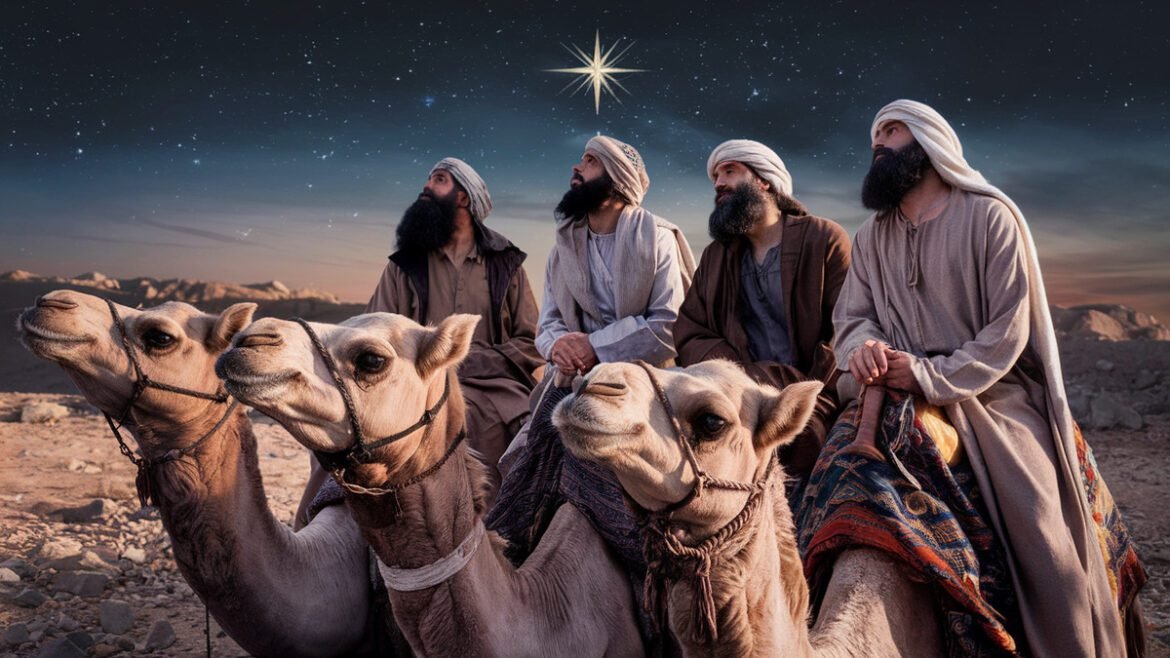The journey of the Wise Men, or Magi, is one of the most cherished stories in the Bible’s Christmas narrative. Yet, beyond their star-following adventure lies a profound lesson about the heart of worship. Let’s delve into their story and uncover the spiritual treasures they left behind for us today.
1. True Worship Begins with Seeking (Matthew 2:1-2)
“Where is the one who has been born king of the Jews? We saw his star when it rose and have come to worship him.” (Matthew 2:2)
The Wise Men were likely scholars or astrologers from Persia, deeply familiar with celestial patterns and ancient prophecies. Their journey began with a longing—a quest to find the newborn King. Despite their wealth and knowledge, they sought something greater, following a star across vast and dangerous lands.
In our lives, worship starts with a similar desire. It’s not about rituals or routines but an intentional pursuit of God. Like the Wise Men, we must actively seek Him in the Word, prayer, and even in the beauty of creation.
Practical Tip: Seek God daily by setting aside intentional quiet time, even if it’s just 10 minutes, to read Scripture or pray.
2. Worship Requires Sacrifice (Matthew 2:10-11)

“On coming to the house, they saw the child with his mother Mary, and they bowed down and worshiped him. Then they opened their treasures and presented him with gifts of gold, frankincense, and myrrh.”
The gifts of the Magi weren’t random—they were costly, symbolic, and heartfelt:
- Gold: Representing Christ’s kingship.
- Frankincense: Acknowledging His priestly role.
- Myrrh: Foretelling His sacrificial death.
Their act teaches us that true worship involves offering something valuable. It may not be gold or spices, but it could be our time, talents, or trust. Worship that costs us nothing is not genuine.
Practical Tip: Consider how you can sacrifice in your worship today. Is it through volunteering, giving generously, or prioritizing time with God over other distractions?
3. Worship is Humble (Matthew 2:11)
The Wise Men, despite their status and wisdom, knelt before a child in a modest home. Their posture spoke volumes—they recognized the greatness of Jesus, even in His infancy.
True worship is marked by humility. It’s about acknowledging God’s greatness and our dependence on Him. Worship isn’t about us; it’s about surrendering ourselves to the One who is worthy.
Scriptural Tie-In: Philippians 2:10-11 reminds us that “at the name of Jesus, every knee should bow…” Worship is not just a practice but an act of reverence and submission.
4. Worship Transforms Our Path (Matthew 2:12)

“And having been warned in a dream not to go back to Herod, they returned to their country by another route.”
After encountering Jesus, the Wise Men didn’t leave the same way they came. Their worship led them to obedience and a changed path.
Similarly, true worship changes us. It reshapes our priorities, alters our attitudes, and redirects our lives toward God’s will. Worship isn’t a momentary experience; it’s a transformational journey.
Practical Tip: Reflect on how encountering God has changed you. Make a note of one habit or mindset you can shift to align with His will.
5. Worship Recognizes God’s Sovereignty
The Wise Men’s story is steeped in faith. They followed a star without knowing where it would lead. Their journey was dangerous, their destination uncertain, yet they trusted God’s guidance.
Worship means recognizing God’s sovereignty, even when the path is unclear. It’s about trusting that He is leading us, even in the dark nights of life.
Scriptural Tie-In: Jeremiah 29:13 assures us, “You will seek me and find me when you seek me with all your heart.” God promises to guide those who pursue Him wholeheartedly.
FAQ: Lessons from the Wise Men
1. What can we learn from the Wise Men’s gifts?
Their gifts—gold, frankincense, and myrrh—symbolize Jesus as King, Priest, and Sacrifice. They teach us to offer our best in worship.
2. How does the story of the Wise Men inspire modern worship?
The Wise Men’s journey reminds us that worship requires intentionality, sacrifice, humility, and faith. Their example inspires us to seek God actively and let worship transform our lives.
3. How can I worship like the Wise Men in my daily life?
- Spend time in prayer and Scripture.
- Offer your resources, talents, or time to serve others.
- Approach God with humility, recognizing His greatness and your dependence.
Final Thoughts
The Wise Men teach us that worship is not confined to a place or time. It’s a lifestyle of seeking, sacrificing, humbling ourselves, and being transformed by God’s presence. As we reflect on their journey, may we rekindle a heart of worship that mirrors their faith, devotion, and awe.
So, this Christmas season and beyond, let’s follow their example. Let’s seek Him wholeheartedly, bow before Him humbly, and offer Him our best. Because true worship isn’t just about finding Jesus—it’s about letting Him transform us.
References
- The Holy Bible, Matthew 2:1-12.
- Jeremiah 29:13, Philippians 2:10-11, Romans 12:1-2.



